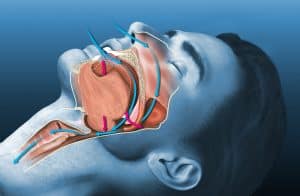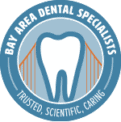TMJ and Airway Treatment: A Whole-Body Approach to Better Health
Many people think of temporomandibular joint (TMJ) disorder as a jaw problem, but it’s often connected to airway health too. Jaw alignment issues can affect breathing, leading to snoring, obstructive sleep apnea, and other airway problems.
At Bay Area Dental Specialists, Dr. Bhave takes a comprehensive, whole-person approach to treating TMJ and airway disorders to help our patients achieve both symptom relief and improved overall health.
Understanding TMJ Disorder & Airway Issues
The temporomandibular joint hinges on your jaw and skull. If your TMJ isn’t working smoothly, you can experience:
- Jaw pain
- Jaw stiffness
- Clicking or popping when moving your jaw
- Jaw locking
- Headaches and migraines
- Tinnitus (ear ringing) or ear pain
- Facial muscle soreness and pain
Common causes of TMJ disorder include bite misalignment, bruxism (teeth grinding,) teeth clenching, and frequent stress-related muscle tightening. Traumatic jaw injuries and chronic joint diseases, like arthritis, can also play a role.
When these conditions are present, the condyle, a key part of the jaw joint, can break down. As it deteriorates, the jaw can shift, which triggers the symptoms of TMJ. But that’s not the only effect of this shift.
How TMJ and Airway Health Are Connected

That’s why TMJ disorder is often linked to:
- Snoring and Sleep Apnea: A misaligned jaw can block airflow, contributing to breathing interruptions.
- Mouth Breathing: Poor jaw posture can lead to chronic mouth breathing, which can cause tooth decay and also affect overall health.
- Muscle Strain: Airway resistance and TMJ dysfunction can cause muscle strain, leading to headaches and back pain.
Signs and Symptoms of TMJ and Airway Disorders
People with TMJ and airway issues often experience overlapping symptoms, including:
- Jaw or facial pain
- Fatigue due to poor sleep quality
- Frequent headaches
- Snoring or waking up gasping for air
- Poor posture
- Muscle tension
Untreated, these symptoms may cause a major decrease in quality of life.
Diagnosis and Evaluation
Dr. Bhave performs a comprehensive exam and reviews your symptoms. She expertly evaluates bite alignment, muscle tension, and joint function. In addition, you’ll have a 3D CT scan to assess your jaw, teeth, and airway in extreme detail. You may also need a breathing test or a sleep study.
Treatments for TMJ & Airway Health

- Oral Appliances: Custom-made mouthguards or splints reposition the jaw and help ease symptoms while improving breathing.
- Orthodontics: Bite alignment can help reduce jaw and muscle strain.
- Dental Restorations: Crowns, implants, and other treatments restore damaged or missing teeth and promote healthy alignment.
- Myofunctional Therapy: Exercises that strengthen facial and tongue muscles can promote proper breathing.
- Lifestyle Changes: Posture correction, stress reduction, and sleep position adjustments can work alongside dental treatments.
For more severe cases, treatment may include jaw realignment or airway expansion procedures.
Why Choose Our TMJ and Airway Treatment Services?
At Bay Area Dental Specialists, we specialize in airway-focused dentistry, providing:
- Advanced Diagnostics: The latest state-of-the-art technology, including 360-degree CT scans, in our office.
- Personalized Treatment Plans: According to your diagnosis and unique needs.
- Comprehensive Care: Dr. Bhave and our team treat you as a whole person to simultaneously improve your oral and general health.
As a fellowship-trained prosthodontist, Dr. Bhave has extensive postgraduate training in complex dental and body wide health needs. She’s passionate about restoring both smiles and health.
TMJ and Airway Treatment: Frequently Asked Questions (FAQs)
How common is TMJ disorder?
TMJ disorder affects up to 12% of Americans, with women experiencing it about twice as often as men. Stress, teeth grinding, and jaw misalignment are common risk factors. If you have persistent jaw pain or related symptoms, seeking treatment can prevent long-term issues.
How is TMJ related to airway problems?

How do I know if my TMJ is affecting my breathing?
Jaw pain with headaches, snoring, or difficulty breathing through your nose may indicate TMJ-related airway problems. Dr. Bhave performs comprehensive evaluations to detect and diagnose TMJ and airway issues.
What role does tongue posture play in TMJ and airway issues?
The tongue’s resting position is crucial for TMJ health and airway function. A tongue that rests low in the mouth may indicate an airway issue. Proper tongue posture—where the tongue rests on the roof of the mouth—helps keep the airway open and supports a well-aligned jaw.
Can treating TMJ improve airway function?
Addressing TMJ disorders through treatments like oral appliances, orthodontics, or restorative dentistry can improve airway function. A properly aligned jaw can create more space in the airway, making breathing easier, especially at night.
Are there non-surgical treatments for TMJ and airway issues?
Many non-surgical treatments are available, including custom oral appliances to reposition the jaw and improve breathing. Other Bay Area Dental Specialists options include orthodontics (like Invisalign clear braces) and tooth restorations, like crowns or dental implants.
Do I need an oral appliance or orthodontic treatment?
It depends on your specific case. An oral appliance can ease pressure on painful joint, while you could need orthodontic treatment if a misaligned bite contributes to your symptoms. Dr. Bhave will assess your jaw alignment and recommend the best option for long-term relief.
How long does TMJ treatment take?

Orthodontics take longer, typically up to a year, but they often work alongside other treatments so that you can expect symptom relief before that time.
Can treating TMJ improve my sleep?
Yes! TMJ issues can contribute to airway problems and sleep disorders like obstructive sleep apnea. TMJ treatment can improve airflow, reduce snoring, and improve sleep quality by properly aligning the jaw and reducing muscle tension. Improved sleep also has daytime benefits, like less drowsiness and brain fog, with enhanced focus.
Can TMJ go away on its own?
Mild TMJ symptoms may sometimes improve with rest and stress management, but chronic or worsening pain requires professional treatment. Without care, untreated TMJ disorder can lead to long-term damage and worsening symptoms.
Will a night guard help my TMJ symptoms?
A custom night guard can help prevent teeth grinding and reduce stress on the TMJ. However, a poorly fitted over-the-counter night guard may worsen symptoms. A custom mouthguard from Dr. Bhave ensures optimal comfort and effectiveness.
Next Steps: Booking a Consultation in San Jose
If you have jaw pain and stiffness alongside breathing issues or snoring, a TMJ and airway evaluation is the first step toward relief. Call our office today to schedule a consultation with Dr. Bhave and start your path to better health.


